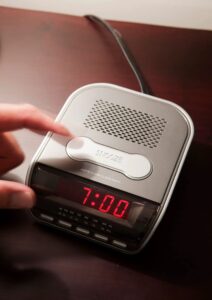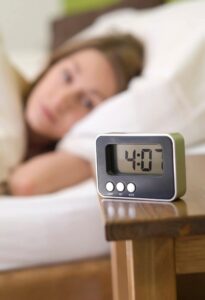A nurse has a warning for anyone who sets multiple alarms in the morning.
For many people, particularly night owls or sleep-deprived parents, setting multiple alarms can be a handy way to guarantee you wake up in the morning.
Although this may seem the simplest way to ensure you get up on time, it turns out it’s actually counterproductive.
Nurse Jordan Bruss has gone viral after warning her TikTok followers to stop setting multiple alarms.

People have been left concerned by the nurse’s video, with one viewer writing: “If I could wake up with just one alarm, do you think I would use so many?”
Another adds: “I can’t just ‘get up.’”
“Okay, well it’s either that or I don’t go to work,” moans a third.
In the viral video, nurse Bruss explains why this common practice might be doing more harm than good.

The nurse says that settling multiple alarms in the morning can disrupt your rapid eye movement (REM) sleep cycle.
According to Medical News Today, REM is when your brain and body experiences several changes, such as rapid eye movement, increased heart rate, and blood pressure.
It can lead to numerous negative effects, including sleep inertia (the disoriented feeling when waking up), increased drowsiness throughout the day, persistent fatigue, mood swings, and elevated cortisol levels, which is ‘your body’s main stress hormone,’ per WebMD.
Each time an alarm goes off, it triggers a ‘fight or flight’ response in our bodies.
This sudden surge of adrenaline is stressful, and when repeated multiple times each morning, it can have long-term consequences.
Bruss says it can contribute to long-term stress, depression, cardiovascular problems, and even weight gain – yep, repeated alarm-induced stress can also affect our waistlines.
But the nurse isn’t the only expert issuing a warning.

Sleep coach Beatrix Schmidt says she used to set two to three alarms when she struggled with long-term insomnia.
She’s observed various iterations of this behavior in clients, with one extreme case involving the person setting ‘over 20 alarms, each five minutes apart.’
The primary issue with multiple alarms is sleep fragmentation during the final hours of rest.
Sleep fragmentation is repeated, short sleep interruptions that lead to excessive tiredness throughout the day, per Eight Sleep.
“Having this fragmentation at the end can really affect how energized you feel in the morning,” Schmidt .
The sleeping coach describes a typical scenario: you might wake up to the first alarm, hit snooze, and drift off again.
The second alarm might prompt you to turn on the lights before dozing off a second time.
Finally, the third or last alarm gets you out of bed.
So, what’s the solution?

Bruss’ advice is simple but may be challenging for many: “When that alarm goes off in the morning, get up!”says
The expert suggests two effective strategies for those who tend to oversleep.
Firstly, she advises moving your alarm device away from your bed, requiring you to get up and turn it off.
While Schmidt recommends creating an important and fulfilling morning routine for you to look forward to, such as reading or listening to music – but not in your bed!
“Why don’t you intentionally do something that actually brings some joy into your morning routine?” the sleep coach says.
Both experts also highlight how you shouldn’t expect yourself to be fully alert immediately upon waking, with Schmidt stressing: “Remember, waking up is a transition, not a switch!”
As Bruss puts it: “Don’t keep traumatizing yourself!”
